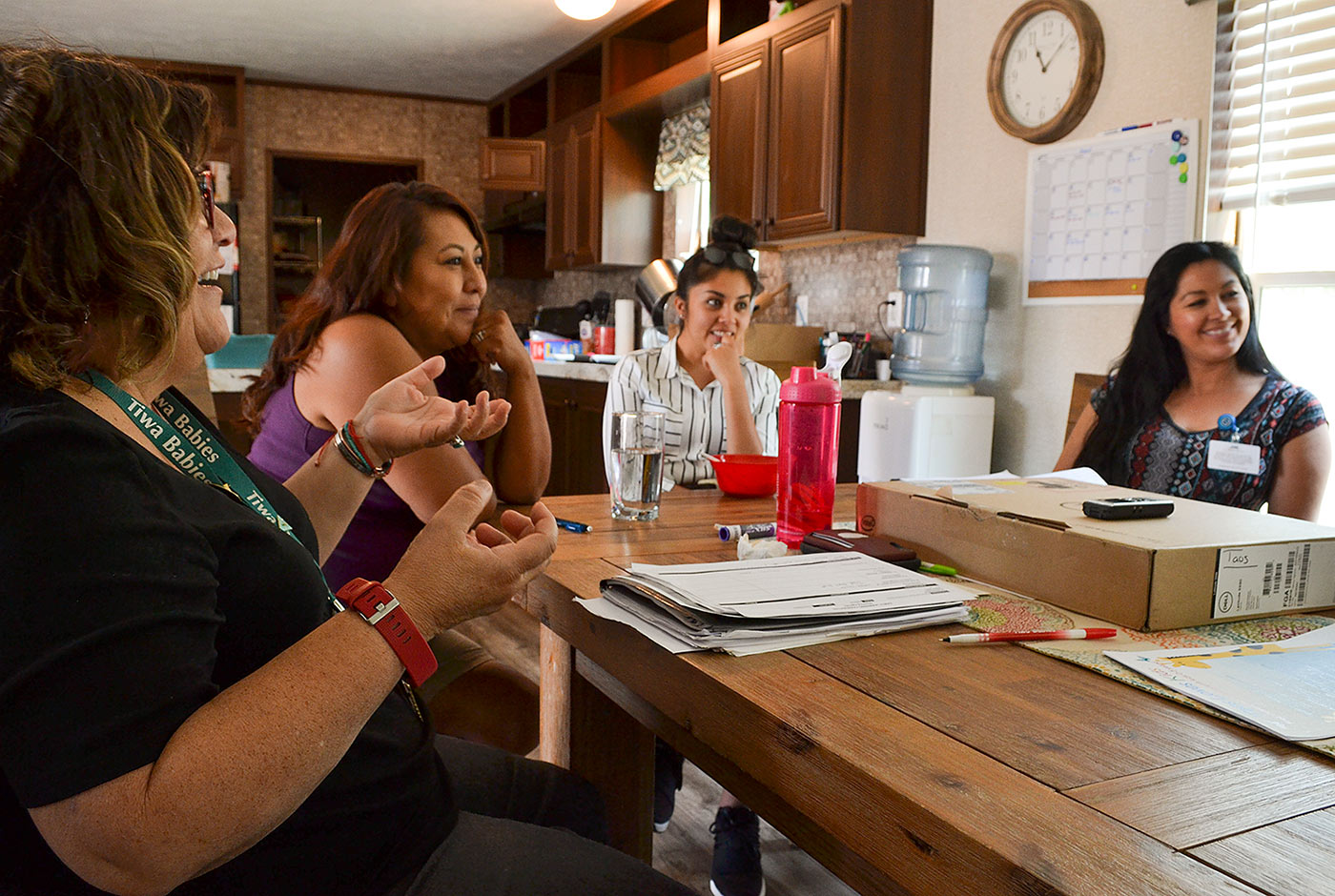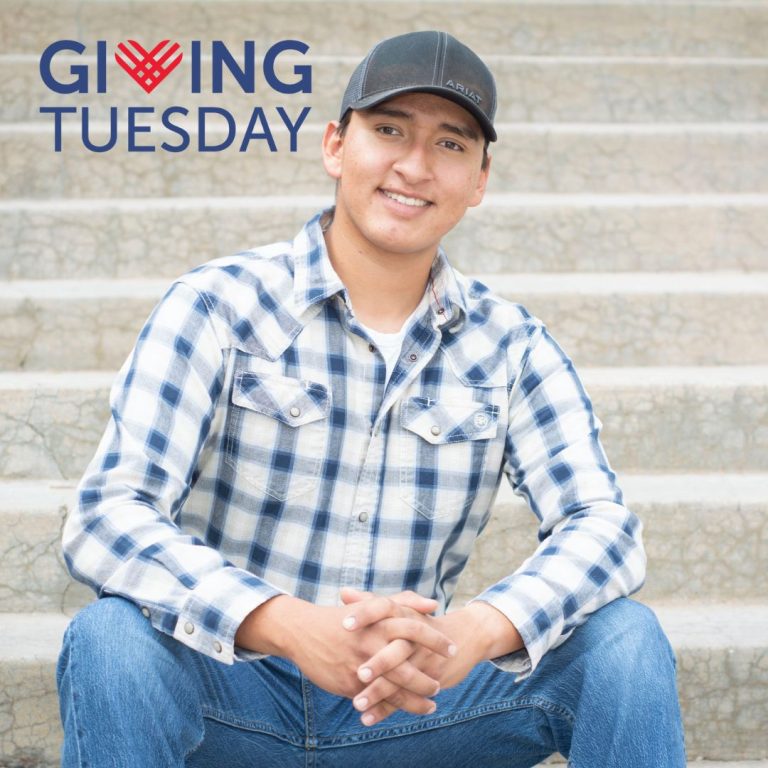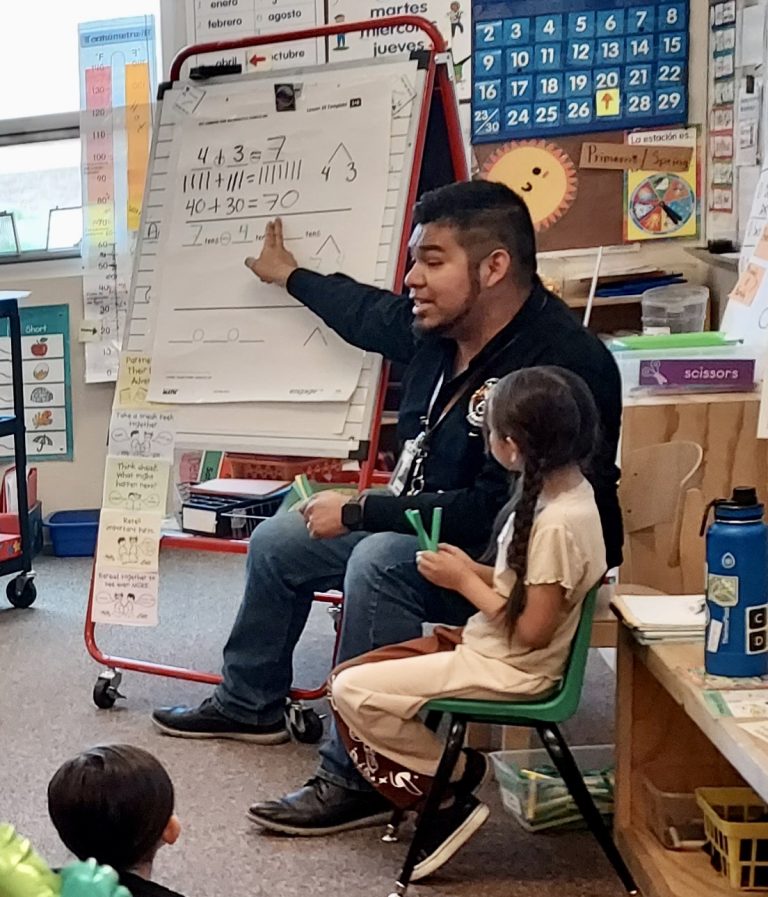Offering Culturally Grounded, Strength-Based Support for Young Children & Families
Raising an infant can be a daunting task, whether you are a first-time parent or have more than one child. No matter how much love and support they may have from family and friends, parents may still feel overwhelmed. Few parents have studied early childhood development and know the best way to nurture their infant’s learning at each stage of growth.
That is where early childhood home visiting programs such as Tiwa Babies (www.tiwababies) come in. Tiwa Babies’ goal is to help families from Taos Pueblo and the surrounding community nurture their children in ways that promote optimum child health and development and honor cultural traditions and values. The program, which was launched in 2014, offers home visiting services free of charge to any family expecting a child or those with a child under five years old. Supportive services are not just for first-time families or members of Taos Pueblo, any parent in Taos County with a child under age five may participate.
Benefits for Every Family
The staff from Tiwa Babies hope to raise awareness about how home visiting can benefit every family and dispel misconceptions about the program.
“I think one of the downfalls of when home visiting has been put out there is that it’s always advertised for at-risk populations,” said Tiwa Babies Family Support Specialist April Winters. “Our program is serving a very diverse group of families. Regardless of what your education and background are, when it comes to parenting, the support is really important for families.”
“Sometimes people think you’re in home visiting because you’re a bad parent, or because you can’t do your job,” said Katherine Chavez, Tiwa Babies Program Coordinator/Home Visitor. “My wish is that everybody would say, ‘home visiting will help me learn about how what I’m doing already is helping my child’s development, helping my child to be successful.’ That’s my goal in life, to get home visiting to just be the norm.”
Kyle Lynn Martinez and daughter Rosslyn are participants in Taos Pueblo’s Tiwa Babies home visiting program, one of many early childhood programs supported in collaboration with the LANL Foundation’s Pueblo Outreach Project, made possible by the W.K. Kellogg Foundation.
Home visiting services focus on parent-child interaction and relationship. Rather than a “do this/don’t do that” approach, home visitors support parents by helping them understand their child’s developmental stages in the areas of communication, physical ability, social skills, problem-solving and the opportunities that each stage offers for learning. Curriculum is tailored to each child’s unique developmental path and the strengths each parent brings to the process.
“We really come from a strength-based perspective, working with parents and helping them to see what they’re doing that’s working, that they’re not even realizing. Like, I read to my child. I’m getting my child school ready, and all the impacts that early literacy has,” Winters said.
“I like highlighting the things they are doing that are supporting their child’s development and their family wellbeing. Because I work with families where just saying, ‘Oh, that’s awesome you’re doing that,’ or, ‘You’re doing a great job,’ moms look at me like, ‘Nobody has ever said that to me, that I’m doing an okay job as a mom,’” Chavez said.
Home visitors receive ongoing training and certification in areas such a child development, emotional intelligence, infant mental health and the impacts of childhood trauma. Despite their scientific knowledge base, home visitors do not take a one-size-fits-all approach to working with parents. They spend time getting to know the child and family, suggesting learning activities specific to the individual child’s needs at each stage.
“We tell parents, they’re the experts, not us,” Chavez said. “We’re the experts in child development, but they’re the experts with their child. And that partnership, that’s why children will be successful.”
More Than a Job
For the Tiwa Babies home visitors, the work they do is holds a deeper meaning than a typical job.
“For me, it’s my love of working with families and being able to make a difference, and impacting them in one form or another,” Winters said. “Before I got hired with this job, I put it out there to the universe that I wanted to come back and do meaningful work for my people…. So it really just comes from a place of sincere compassion, of wanting to work and serve my Taos Pueblo community.”
“I got into this field of early childhood because of my kids. I didn’t know what I was doing. I didn’t have guidance. I told myself, I have to learn about early childhood for my own sanity or for my kids’ sake. And I saw the difference in me as a mom,” Chavez said.
“For me, home visiting is a form of healing work,” said Aspen Mirabal, the newest member of the home visiting team. “And even though your intention is not to change a family or perfect a situation, whenever you’re bringing positive intentions into the home or even the office setting, it’s a healing space, and it’s an opportunity for families to feel vulnerable and safe with you.”
Support Above and Beyond
Tiwa Babies offers additional support to families both in and out of the program, such as monthly Family Circles, where parents and children participate in a variety of hands-on learning activities and connect with other families.
“This is a way for families to get out of that isolation, have some social interaction, be able to maybe make friends and relate with other parents about the challenges of parenting and allow the children also to have that social interaction,” Winters said.
Staff also work to connect families to available resources they may need and to facilitate the transition from home visiting to enrolling their child in Head Start.
The effectiveness of the program is evident in the relationships that are built and the number of returning participants.
“We’ve had a really high return rate of families that are wanting to come back for the service we provide to them, who have utilized the program for maybe a couple of months or years, and then they no longer need the services. But when they need it again, they come back,” Winters said.
A Boost from the W.K. Kellogg Foundation and the LANL Foundation
Tiwa Babies’ major funding source is a grant from the Administration for Children and Families Maternal, Infant, and Early Childhood Home Visiting (MIECHV) program. The grant currently supports three home visiting staff members serving 26 families. Their goal is to add another home visiting staff member so they can serve 40 families.
“While we’re concerned with numbers, our concern is also quality home visits and quality relationships with families, and not just getting them in and out of the door,” Winters said.
Tiwa Babies is one of the programs benefiting from Los Alamos National Laboratory (LANL) Foundation’s Pueblo Outreach Project, funded through two consecutive grants from the W.K. Kellogg Foundation.
The initial $1,066,240 grant, which also funded statewide early childhood initiatives, was used to help each of the Eight Northern Pueblos assess early childhood services, identify gaps and develop Early Childhood Plans that defined their mission, vision, values, community priorities and a path to achieving their goals for early childhood education. LANL Foundation staff formed in-depth partnerships with Tribal leadership in Pueblo communities of Nambé, Ohkay Owingeh, Picuris, Pojoaque, San Ildefonso, Santa Clara, Taos and Tesuque and worked collaboratively with them to define and develop their plans.
Tribal leadership’s commitment to the Pueblo Outreach Project has strengthened the Tiwa Babies program.
“Having that investment from leadership to support our initiatives is also really amazing to see,” Winters said.
A second Kellogg grant of $1,197,675 to the LANL Foundation in support the ongoing Pueblo Outreach Project is dedicated to implementing the Early Childhood Plans and insuring their sustainability. As part of the program, each Pueblo receives a monthly stipend to use at their own discretion to support early childhood programming. Each Pueblo can also apply for up to $3,300 ($4,500 in the second year) of grant money for capacity-building activities, including early childhood initiatives, family gatherings, education, training and other projects that support children and families.
The stipend and grant money are helping Tiwa Babies augment and improve services. They are hiring a family navigator who can connect families to a variety of support services available to them and devoting funds to professional development. Some of the funding paid registration fees for partner organization staff members to attend the 2019 New Mexico Home Visiting Summit (sponsored by the LANL Foundation and Santa Fe Community College), which focused on addressing childhood trauma. This aligned with Tiwa Babies desire to support its partner organizations, provide education about a serious issue and expand awareness of the role home visiting programs play in addressing such issues.
Additional benefits of the Pueblo Outreach Project have included strengthening existing partnerships with other governmental and nonprofit organizations devoted to early childhood wellbeing. The Tiwa Babies office has become a center for connecting families to those outside organizations.
“We really want this to be that hub, that go-to place where people can be connected to other resources besides our own,” Winters said.
The Pueblo Outreach Project is helping Tiwa Babies achieve smaller but significant goals as well. During the mapping process, participants were asked to envision what a healthy, happy community would look like. Taos Pueblo participants included a family play space in that vision. LANL Foundation staff helped connect Tiwa Babies to a funder for that project, which is now in the planning stages. Some of the funds will also purchase a projector for use in trainings and community presentations.
The Tiwa Babies staff were excited to receive a laptop with all the information related to the Pueblo Outreach Project and Taos Pueblos’ Early Childhood Plan downloaded into it. The computer and information will assist them as they work to strengthen and expand their program.
Left to right: Katherine Chavez, Jackie Martinez, Aspen Mirabal and April Winters
Written by Arin McKenna, Photos by Andrea Neal
Read more about a Taos Pueblo family’s experience with Tiwa Babies’ home visiting services »
Read more about the EC Pueblo Outreach Project work achieved in Phase 1 »
Read more about the EC Pueblo Outreach Project work achieved in Phase 2 & W.K. Kellogg Foundation funding »



